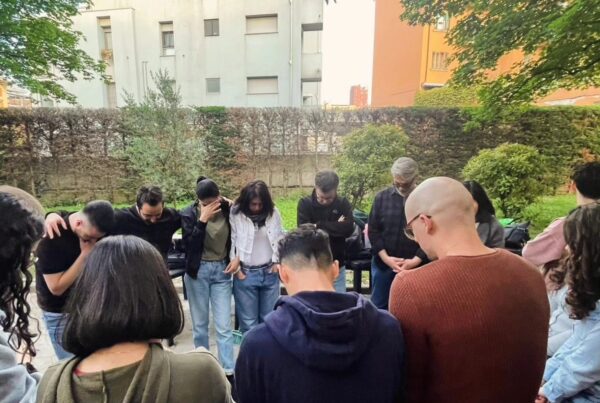A couple of weeks ago, I was sitting in a room with a precious group of men and women who gather each week on a Tuesday night to open our Bibles and hearts to one another. We call these midweek small-groups in our church “gospel communities”, because our goal together is not merely good fellowship or good advice, but to recalibrate our hearts to the good news. As Dietrich Bonhoeffer wrote, “the goal of all Christian community [is that we] meet one another as bringers of the message of salvation”.1 During our discussion that night, one of the men confessed the crippling shame he felt from a failure in his past and his lingering regret about it. It was a moment raw with vulnerability and honesty. It was holy ground. Yet after he finished speaking, two things happened. First, his confession wasn’t met with scolding but with the gospel. One by one, his brothers and sisters in Christ around the room pointed him to Jesus, reminding him that Jesus severed the power of shame when he took the shame of our every sin upon himself on the cross (Hebrews 12:2). Second, his honest confession broke through the pretence that we so often put on like a mask with one another, to hide our true selves. In the aftermath of his own confession, others around the room began to confess areas where they were struggling right now in the present. And we experienced together the reality that admission of weakness and honest confession aren’t places to avoid but are our doorway into God’s redemptive power.
Healing in Horizontal Confession
Confessing our sins vertically brings forgiving impact, for as 1 John 1:9 reminds us, “If we confess our sins, he is faithful and just to forgive us our sins and to cleanse us from all unrighteousness.” So by all means, let’s do that first and frequently, confident that Jesus is the Saviour who is never fatigued in his willingness to forgive. My friend Ray Ortlund reminds us:
Do you really think, after the cross, your shame drives God away? Nope. Your shame is precisely where he can re-create you the most gloriously. You think you’re disgusting to him? Wrong again. The worst things about you are where he loves you the most tenderly. God welcomes high-maintenance [people] who keep coming back to him for more mercy and more mercy and more mercy, multiple times every day. He isn’t tired, and he isn’t tired of you.2
Yet confessing our sins horizontally, to one another, does something different. It brings healing impact. In James 5:16 we are told, “Confess your sins to one another and pray for one another, that you may be healed.” Relationships within your church that are marked by vulnerability and truth and grace are the most important relationships you can cultivate in your walk as a follower of Jesus. These are relationships marked by humility, where telling the truth about our sin isn’t weird and repenting of our sins against each other is normal. A gospel culture is one where shame is drowned in the waters of honest confession. It is a place where we honour one another, free from the need to pretend we are better than we are, because we are collectively convinced that Jesus is a better Saviour than any of us could dream of.
A Humble People
So don’t seek honour. Seek Jesus. That’s the only way our churches will become places notorious for humility, places of honour where honest confession and godly repentance are normalised. Imagine what our witness might be if the Christians of our time were to recover a reputation for being a humble people who aren’t preoccupied with themselves or constantly promoting themselves, because they are satisfied in the glory of Jesus. Imagine what would happen if we become a people who aren’t afraid of confessing our sin when we get it wrong, because we are convinced that Jesus is the friend of sinners (Matthew 11:19) and that “if we confess our sins, he is faithful and just to forgive us our sins and to cleanse us from all unrighteousness” (1 John 1:9). Imagine what it would be like to be part of a people who have made peace with their weakness; who have exchanged a self-confident swagger for a holy limp; who have learned to say with Paul, “For the sake of Christ, then, I am content with weaknesses, insults, hardships, persecutions, and calamities. For when I am weak, then I am strong” (2 Corinthians 12:10). In other words, imagine what it would be like to be a people who gradually, but unmistakably, look more and more like Jesus.
Let’s follow our Saviour into humility. Let’s allow God to be the one who exalts us, rather than trying to climb over one another to places of importance. Let’s find life in the low place. And as we do, let’s hunt for ways to “love one another with brotherly affection [and] outdo one another in showing honour” (Romans 12:10).










